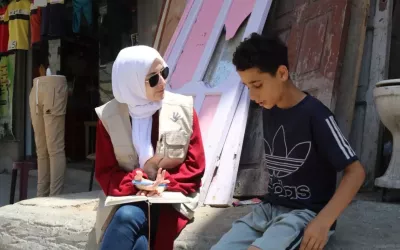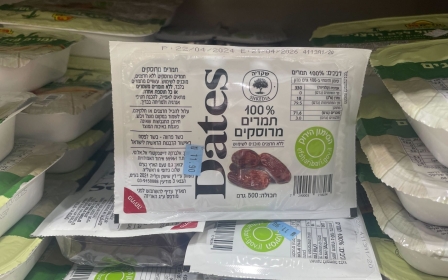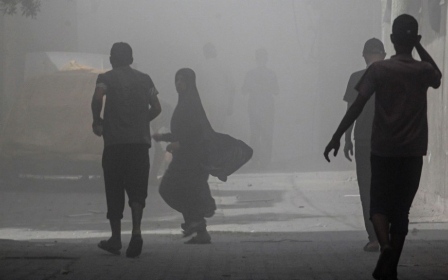Report on Israeli targeting of journalists adds to scrutiny of women’s foundation

An investigation highlighting the Israeli military’s targeting of journalists in Gaza has heaped further pressure on the International Women’s Media Foundation (IWMF), which has come under fire for rescinding an award from Palestinian reporter Maha Hussaini last week.
The Guardian published a report on Tuesday into Israel’s loosening of its interpretations of the laws of war, including by considering some journalists to be legitimate targets.
The report was carried out as part of the Gaza Project, a collaboration led by France-based NGO Forbidden Stories.
At least 103 Palestinian journalists have been killed by Israel’s war on Gaza since 7 October, according to the Committee to Protect Journalists (CPJ). Other organisations believe the number is higher.
The Guardian noted that Israeli officials had consistently characterised journalists killed in Gaza as “terrorists”, while providing little evidence.
New MEE newsletter: Jerusalem Dispatch
Sign up to get the latest insights and analysis on Israel-Palestine, alongside Turkey Unpacked and other MEE newsletters
Irene Khan, the UN’s special rapporteur on freedom of expression, told the investigation that Israel had “spread disinformation about journalists being linked to militants” without meeting the “burden of proof” for such claims.
In one example, Issam Bahar, a freelance journalist who had worked for the Hamas-run al-Aqsa media network, among other media outlets, was killed by Israeli bombardment in mid-October.
The Israeli military accused him of being a “terrorist”, but relatives said he was “a journalist and a teacher of the Quran” with no “political or other activity”.
The investigation comes just days after IWMF withdrew its Courage in Journalism Award from Hussaini, who was initially awarded the prize on 10 June for her reporting for Middle East Eye in war-torn Gaza.
Following false allegations made by conservative US publication the Washington Free Beacon, the IWMF rescinded the award.
The Washington Free Beacon erroneously described Hussaini as a supporter of Hamas and an antisemite, citing social media posts commenting on the Israeli-Palestinian conflict and her own experience as a Palestinian woman trapped under Israeli occupation and siege in the Gaza Strip.
The decision was made without consultation with Hussaini, and has since been condemned by Middle East Eye, media rights organisations, and the journalist herself.
'Personal attacks put Gaza journalists at risk'
With the Israeli military accused of deliberately targeting Palestinian journalists and anyone with alleged or perceived links to Hamas, Hussaini said the IWMF decision had “put my life at risk”.
“Each announcement of an award to a Palestinian journalist is systematically followed by extensive smearing campaigns and intense pressure on the awarding organisations from supporters of the Israeli occupation,” she said.
Since the 7 October Hamas-led attack on Israel and ensuing war on Gaza, more than 37,000 Palestinians have been killed by the Israeli military, mostly women and children.
The CPJ has reported that it has been the deadliest period for journalists since the NGO began gathering data in 1992.
In that context, people have leapt to Hussaini's defence and expressed serious concern about her safety and wellbeing.
The Marie Colvin Journalists’ Network, which supports Arab female journalists, expressed its "full solidarity and support" for Hussaini.

Meanwhile, the UK's National Union of Journalists condemned the "concerted campaign to discredit and impugn Maha Hussaini, a multi-award-winning journalist". It said it was "worried at the impact this has on her safety at a time when journalists in Gaza are facing unimaginable pressures and challenges".
The Rory Peck Trust, which supports freelance journalists around the world, said: "Palestinian journalists like Maha are subjected to scrutiny and criticism of their posts on social media, rarely applied to journalists elsewhere."
"[We are] concerned for Maha’s safety and defend her right, and the right of all journalists, to freedom of expression," it added.
Hussaini is a former recipient of the Rory Peck Trust’s Martin Adler award, given to freelance reporters who work under challenging conditions.
Meanwhile, the CPJ told MEE: “The scraping of journalists’ social media feeds is an increasingly common tactic often undertaken expressly to discredit a journalist’s reporting. These campaigns frequently result in personal attacks on a journalist and their family both online and off, putting the individual at serious risk.”
The CPJ said it defended Hussaini's right to free speech and denounced the smear campaigns that are putting the lives of Palestinian journalists at risk
Elsewhere in the Guardian investigation, it was noted that some within Israel’s military deemed journalists working for media outlets linked to Hamas to be legitimate military targets.
Around 30 percent of journalists killed in Gaza, according to the CPJ, worked for outlets associated with or linked to Hamas.
Some media organisations in Gaza have some form of link to the political wing of Hamas, which acts as the government of the Palestinian enclave.
An Israeli military spokesperson told the investigation there was “no difference” between people working for al-Aqsa media network and the armed wing of Hamas.
According to the rules of war, journalists can lose their civilian status for planning, preparing or carrying out combat operations.
Working for media networks such as al-Aqsa does not make reporters legitimate targets to be killed.
Middle East Eye delivers independent and unrivalled coverage and analysis of the Middle East, North Africa and beyond. To learn more about republishing this content and the associated fees, please fill out this form. More about MEE can be found here.




